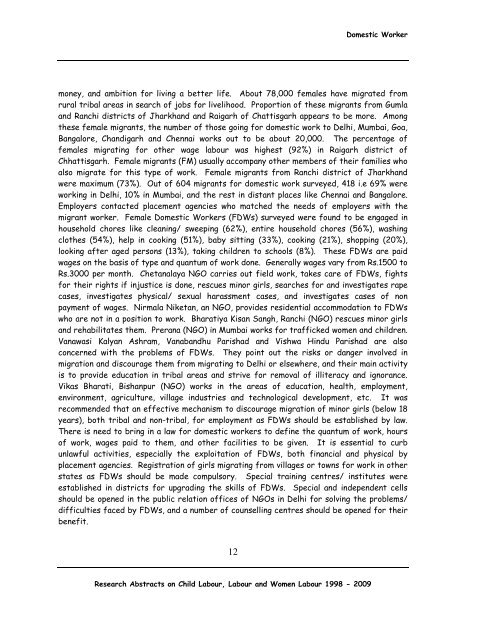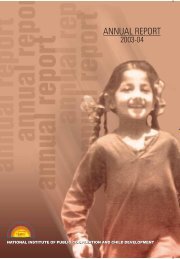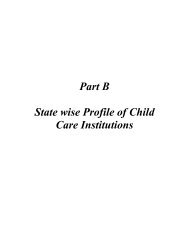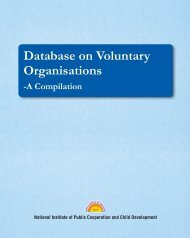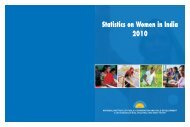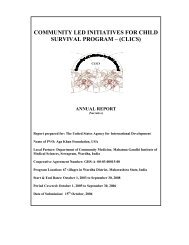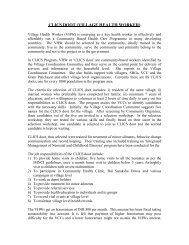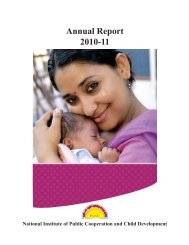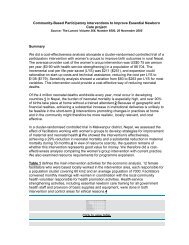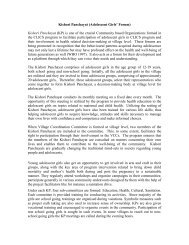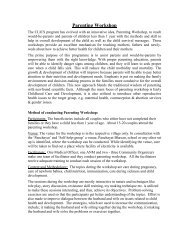Research Abstracts on Child Labour Women Labour - Nipccd
Research Abstracts on Child Labour Women Labour - Nipccd
Research Abstracts on Child Labour Women Labour - Nipccd
Create successful ePaper yourself
Turn your PDF publications into a flip-book with our unique Google optimized e-Paper software.
12<br />
<str<strong>on</strong>g>Research</str<strong>on</strong>g> <str<strong>on</strong>g>Abstracts</str<strong>on</strong>g> <strong>on</strong> <strong>Child</strong> <strong>Labour</strong>, <strong>Labour</strong> and <strong>Women</strong> <strong>Labour</strong> 1998 - 2009<br />
Domestic Worker<br />
m<strong>on</strong>ey, and ambiti<strong>on</strong> for living a better life. About 78,000 females have migrated from<br />
rural tribal areas in search of jobs for livelihood. Proporti<strong>on</strong> of these migrants from Gumla<br />
and Ranchi districts of Jharkhand and Raigarh of Chattisgarh appears to be more. Am<strong>on</strong>g<br />
these female migrants, the number of those going for domestic work to Delhi, Mumbai, Goa,<br />
Bangalore, Chandigarh and Chennai works out to be about 20,000. The percentage of<br />
females migrating for other wage labour was highest (92%) in Raigarh district of<br />
Chhattisgarh. Female migrants (FM) usually accompany other members of their families who<br />
also migrate for this type of work. Female migrants from Ranchi district of Jharkhand<br />
were maximum (73%). Out of 604 migrants for domestic work surveyed, 418 i.e 69% were<br />
working in Delhi, 10% in Mumbai, and the rest in distant places like Chennai and Bangalore.<br />
Employers c<strong>on</strong>tacted placement agencies who matched the needs of employers with the<br />
migrant worker. Female Domestic Workers (FDWs) surveyed were found to be engaged in<br />
household chores like cleaning/ sweeping (62%), entire household chores (56%), washing<br />
clothes (54%), help in cooking (51%), baby sitting (33%), cooking (21%), shopping (20%),<br />
looking after aged pers<strong>on</strong>s (13%), taking children to schools (8%). These FDWs are paid<br />
wages <strong>on</strong> the basis of type and quantum of work d<strong>on</strong>e. Generally wages vary from Rs.1500 to<br />
Rs.3000 per m<strong>on</strong>th. Chetanalaya NGO carries out field work, takes care of FDWs, fights<br />
for their rights if injustice is d<strong>on</strong>e, rescues minor girls, searches for and investigates rape<br />
cases, investigates physical/ sexual harassment cases, and investigates cases of n<strong>on</strong><br />
payment of wages. Nirmala Niketan, an NGO, provides residential accommodati<strong>on</strong> to FDWs<br />
who are not in a positi<strong>on</strong> to work. Bharatiya Kisan Sangh, Ranchi (NGO) rescues minor girls<br />
and rehabilitates them. Prerana (NGO) in Mumbai works for trafficked women and children.<br />
Vanawasi Kalyan Ashram, Vanabandhu Parishad and Vishwa Hindu Parishad are also<br />
c<strong>on</strong>cerned with the problems of FDWs. They point out the risks or danger involved in<br />
migrati<strong>on</strong> and discourage them from migrating to Delhi or elsewhere, and their main activity<br />
is to provide educati<strong>on</strong> in tribal areas and strive for removal of illiteracy and ignorance.<br />
Vikas Bharati, Bishanpur (NGO) works in the areas of educati<strong>on</strong>, health, employment,<br />
envir<strong>on</strong>ment, agriculture, village industries and technological development, etc. It was<br />
recommended that an effective mechanism to discourage migrati<strong>on</strong> of minor girls (below 18<br />
years), both tribal and n<strong>on</strong>-tribal, for employment as FDWs should be established by law.<br />
There is need to bring in a law for domestic workers to define the quantum of work, hours<br />
of work, wages paid to them, and other facilities to be given. It is essential to curb<br />
unlawful activities, especially the exploitati<strong>on</strong> of FDWs, both financial and physical by<br />
placement agencies. Registrati<strong>on</strong> of girls migrating from villages or towns for work in other<br />
states as FDWs should be made compulsory. Special training centres/ institutes were<br />
established in districts for upgrading the skills of FDWs. Special and independent cells<br />
should be opened in the public relati<strong>on</strong> offices of NGOs in Delhi for solving the problems/<br />
difficulties faced by FDWs, and a number of counselling centres should be opened for their<br />
benefit.


